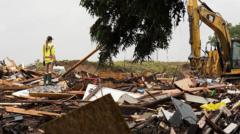**In a significant turnaround, Trump contemplates normalizing relations with Syria following his meeting with interim President Ahmed al-Sharaa. This marks a potentially transformative moment for a nation enduring years of turmoil.**
**Historic Trump-Sharaa Meeting Creates New Hope for Syria's Future**

**Historic Trump-Sharaa Meeting Creates New Hope for Syria's Future**
**Trump's unexpected diplomatic shift raises aspirations for recovery in war-torn Syria.**
In a move that seemed inconceivable only months prior, former President Donald Trump met with Syria's interim leader, Ahmed al-Sharaa, in Riyadh on Wednesday. This meeting has ignited renewed hopes among Syrians as Trump revealed that his administration is contemplating the normalization of relations with Syria following the collapse of the Assad regime.
The 37-minute encounter in a lavish Saudi royal palace was underscored by a supportive presence of Crown Prince Mohammad bin Salman and a distant participation from Turkish President Recep Tayyip Erdogan. During the meeting, Trump expressed optimism about al-Sharaa, who recently ascended to power after decades of oppression under the Assad family, previously having a $10 million bounty on his head, which was only lifted last December.
"I think he has got the potential," Trump stated, reflecting a newfound interest in the conflict-stricken nation. The conversation, previously framed by Trump's dismissive social media comments about Syria, represents a remarkable pivot, drawing applause from attendees at a subsequent investment forum.
Trump's remarks suggested a willingness to ease punitive sanctions on Syria, which could potentially alleviate the dire economic circumstances faced by millions of Syrians living in poverty. “It’s a new light at the end of this tunnel,” welcomed Hind Kabawat, a minister in al-Sharaa's interim government, highlighting the urgent need for international financial engagement to rebuild the ravaged nation.
Yet, lifting the comprehensive sanctions that have severely constrained Syria presents its own challenges. Experts caution that while some sanctions might be revoked through presidential waivers, dismantling the complex web of restrictions requires considerable dedication. The regional dynamics are also shifting, with neighboring powers like Saudi Arabia and Turkey eager to influence the future of Syria.
Trump is expected to push for Syria’s inclusion in the Abraham Accords—a series of normalization agreements between Israel and several Arab states. Al-Sharaa, who has been keen on presenting a pragmatic front, signaled potential openness to normalizing ties with Israel if “the right conditions” are met, despite evidence of ongoing Israeli airstrikes in the region.
Israel's leadership remains wary of al-Sharaa and his past affiliations, complicating the path to peace further. Nonetheless, Trump's administration sees this moment as “a chance at greatness,” while for Syrians, it might herald the long-awaited opportunity for improved living conditions and national recovery.
The 37-minute encounter in a lavish Saudi royal palace was underscored by a supportive presence of Crown Prince Mohammad bin Salman and a distant participation from Turkish President Recep Tayyip Erdogan. During the meeting, Trump expressed optimism about al-Sharaa, who recently ascended to power after decades of oppression under the Assad family, previously having a $10 million bounty on his head, which was only lifted last December.
"I think he has got the potential," Trump stated, reflecting a newfound interest in the conflict-stricken nation. The conversation, previously framed by Trump's dismissive social media comments about Syria, represents a remarkable pivot, drawing applause from attendees at a subsequent investment forum.
Trump's remarks suggested a willingness to ease punitive sanctions on Syria, which could potentially alleviate the dire economic circumstances faced by millions of Syrians living in poverty. “It’s a new light at the end of this tunnel,” welcomed Hind Kabawat, a minister in al-Sharaa's interim government, highlighting the urgent need for international financial engagement to rebuild the ravaged nation.
Yet, lifting the comprehensive sanctions that have severely constrained Syria presents its own challenges. Experts caution that while some sanctions might be revoked through presidential waivers, dismantling the complex web of restrictions requires considerable dedication. The regional dynamics are also shifting, with neighboring powers like Saudi Arabia and Turkey eager to influence the future of Syria.
Trump is expected to push for Syria’s inclusion in the Abraham Accords—a series of normalization agreements between Israel and several Arab states. Al-Sharaa, who has been keen on presenting a pragmatic front, signaled potential openness to normalizing ties with Israel if “the right conditions” are met, despite evidence of ongoing Israeli airstrikes in the region.
Israel's leadership remains wary of al-Sharaa and his past affiliations, complicating the path to peace further. Nonetheless, Trump's administration sees this moment as “a chance at greatness,” while for Syrians, it might herald the long-awaited opportunity for improved living conditions and national recovery.




















